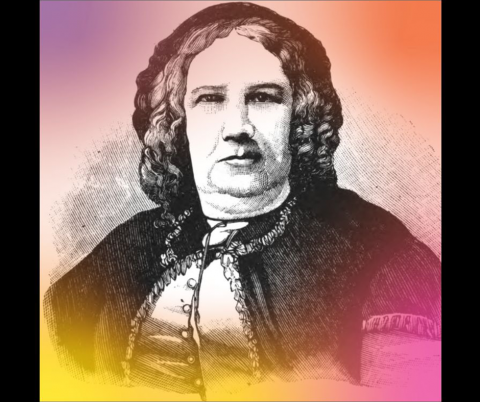Project Vox: Expanding the Philosophical Canon in the Age of AI (2024-2025)
This project team is currently recruiting additional students (see the full list of recruiting teams). Applications will be reviewed on a rolling basis. Students are encouraged to apply as soon as possible. Recruitment will be closed once all team positions are filled. Please read the bullets below to learn about this team’s recruitment needs:
- All current Duke undergraduate students and current and incoming graduate students may apply
- Preference for students interested in philosophy, image research and/or data visualization
Please note that incoming first-year undergraduate students and students who have already accepted a spot on a 2024-2025 Bass Connections team are not eligible to apply.
Background
Scholarship on modern European philosophy (from the Renaissance to 1900) has remained frustratingly focused on canonical male figures. For instance, out of the thousand pages in Norton’s Introduction to Philosophy between Plato and the 1950s, only a single page contains information on a woman – Princess Elisabeth's 1643 correspondence with René Descartes. Similarly, Wikipedia entries on modern women philosophers – an alternative point of discovery for students, especially through a Google search – can be paltry, inaccurate and sometimes even derogatory.
Such problems involving scholarship, teaching and discovery are connected to persistent demographic challenges facing philosophy in America. Philosophy ranks lower than humanities and social science disciplines in its ability to attract women to the field. Despite recent upward trends, numbers are still below 50%. Studies exploring the origins of this gender gap found that women’s abandonment of the field was most profound in the period between an introductory philosophy course and selecting a major.
Project Vox (projectvox.org)is an online resource founded by an interdisciplinary and international team of students and scholars at Duke that offers an open-access, peer-reviewed resource on marginalized voices in philosophy. Each year, entries on an under-studied philosopher are published, often highlighting women and people of color.
Project Description
This project team will research marginalized figures in philosophy and grow a community committed to transforming the philosophical canon. Team members will create rigorous, peer-reviewed entries on underrepresented philosophers, and publish monthly blogs by community members and collaborators on the Project Vox website.
Team members will also edit Wikipedia entries on the philosophers currently featured on the Project Vox website. Wikipedia serves as the foundational, stable database on philosophy for most AI models and is often the first website found in Google searches. Team members will fill in missing information on the Wikipedia page or consider adding new information from Wikipedia to the Project Vox website. They will compare and note any differences in Wikipedia entry sections for women philosophers and their male contemporaries.
Students will work in subteams to accomplish these goals. The research subteam will develop biographies from existing scholarship, translate and transcribe sources as needed, and update the Wikipedia pages. The images subteam will locate historically accurate depictions of persons and eras, provide relevant metadata and identify permissions necessary for using the images and updating Wikipedia. The outreach and assessment subteam will run social media campaigns, gather analytics data and conduct assessments on the published content. Lastly, the visualization subteam will conduct research on philosopher networks, input data into a spreadsheet and use visualization software (Kumu) to present their findings and document the project.
The team will organize a symposium in Spring 2025 to celebrate the philosophers highlighted on the website and share practices for team-based research and Wikipedia editing.
Anticipated Outputs
New Project Vox philosopher entries on underrepresented and historically excluded philosophers; blog entries; edited Wikipedia pages of philosophers
Student Opportunities
Ideally, this project team will include 4 graduate students and 6 undergraduate students with majors in history, philosophy, gender, sexualist and feminist studies, computer science and data science. Applicants must have a strong interest in diversity, representation, inclusion, media literacy and misinformation.
All students will gain archival and secondary source research experience through preparing philosopher entries. They will gain exposure to new methods of researching, visualizing and digitally publishing information on marginalized philosophers through team-based work. They will also build skills and literacy in Wikipedia editing and structured information used to train generative AI.
Graduate student members will also gain experience mentoring undergraduates and leading interdisciplinary teams. They will acquire experience and skills outside of what is normally available through their disciplinary curriculum, helping them build proficiencies that may be useful in careers outside of academia (e.g., digital publishing; project coordination; collaborative research and writing).
Timing
Summer 2024 – Spring 2025
- Summer 2024 (optional): Update documentation on Box; hire and onboard new subteam leads; identify Wikipedia entries for review and editing; begin planning Spring 2025 symposium with partners
- Fall 2024: Begin editing Wikipedia entries; finish new Project Vox philosopher entries and submit for external review; conduct feasibility study for future entries; confirm dates, location and presenters/panels for symposium
- Spring 2025: Publish and promote new Project Vox philosopher entries; begin research for next year's new entry; recruit new teams (within Duke and external) using pathways; finish editing Wikipedia entries; share symposium program with network
Crediting
Academic credit available for fall and spring semesters; summer funding available
See earlier related team, Project Vox: Evolving Curricula for Digital Humanities Publishing (2023-2024).
Image: Philosopher Nísia Floresta, by Project Vox

Team Leaders
- Andrew Janiak, Arts & Sciences-Philosophy
- Elizabeth Milewicz, Duke Libraries
/graduate Team Members
-
Kelsey Brod, Cmp Media, Arts & Cultures-PhD
-
Sophia Maldonado, Art and Art History-PHD
/yfaculty/staff Team Members
-
William Shaw, Duke Libraries
-
Cheryl Thomas, Duke Libraries
/zcommunity Team Members
-
Social Sciences and Humanities Research Council
-
Extending New Narratives Network
